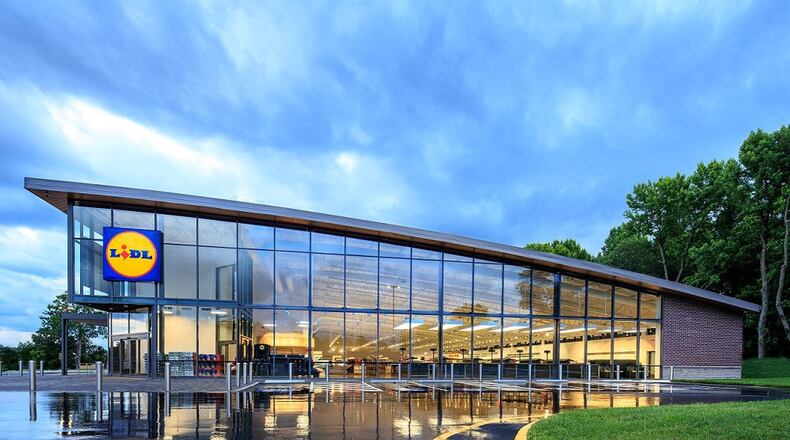» UNMATCHED COVERAGE: For Germany and Dayton, brewery connects people through beer
The grocer had lofty plans to open stores in states outside of the East Coast, including Ohio and Texas. After submitting a land development application to build a store in Beavercreek, the chain halted the project just months later. Sandra Pereira, associate city planner for Beavercreek, said the grocer only had a contract and never owned the land.
“We haven’t heard anything from them since they withdrew their case,” she said.
Beavercreek isn't the only city that the grocer abandoned. The chain stopped construction on some projects around the U.S. In December, it stopped construction on its second New Jersey store due to "budgetary constraints," according to local media. The News Leader reported that Lidl was backing out of a planned store in Staunton, Va., because the company was no longer interested in building in smaller markets.
» RELATED: What is the future of transportation? Ohio looks overseas for answers
Grocery industry expert Brittan Ladd says the slowed expansion has more to do with failed execution of strategy in the U.S. The chain was seen as an immediate contendor with grocery giants like Kroger and Walmart before falling short. While Lidl has opened more than 50 stores in the U.S., it hasn’t been able to keep customers coming back, he said.
A study from digital marketing company Catalina found that Lidl has been able to lure customers in with low prices and its odd store model concept, but they don’t come back as longterm consumers. Ladd said Ohio markets might not be the right fit for the grocer at all.
“I don’t believe the Midwest is the best location for Lidl stores this early in its expansion in the USA,” Ladd told this news organization. “I strongly recommend that the company expand into Texas due to the number of Lidl stores the state could support. Lidl should perfect its stores and operations in Texas and then expand outward into adjoining states including Mexico eventually.”
» RELATED: German company with local presence restructures, acquires new business
A Lidl spokesperson told this news organization that the company has “secured sites for future growth,” but the company’s focus continues to be along the East Coast. The company did not comment on why the application to build in Beavercreek was withdrawn.
Lidl operates more than 10,000 stores in Europe, and started in 1973 in Ludwigshafen, Germany — just 25 miles south of Frankfurt. In the 1990s, the chain started expanding outside of Germany. It is known for its discounted prices on food products, its private labels and innovative store layouts — and it even sells “fashionable but casual” clothing.
The quirky store concepts have shoes and clothes in bins that sit next German chocolate candies and canned soup.
Lidl carries mostly its own labels — about 90 percent of its products are private label and the stores partner with local and regional farms and suppliers for fresh products. Lidl also describes its stores as carrying “more than just food.” Lidl sells everything from Halloween costumes and clothes to wine, cleaning products, frozen foods, organic products and pet accessories.
FIVE FAST READS
• You won't believe the inside of this INCREDIBLE Oakwood house
• 5 surprising ways Kroger is changing stores in 2018
• Air Force adapts training for medics
• Sears among six retailers closing in Ohio this year
• Thunderbirds celebrate milestone year representing US Air Force
Lidl’s rocky start doesn’t mean American consumers won’t buy in when it comes to foreign grocery concepts. When another German grocer Aldi reaches 2,500 stores, they will be the third largest grocery retailer in the U.S. and they could seriously compete with Kroger and Walmart. Aldi has added several stores in the region in the past two years, focusing its growth in suburban areas like Beavercreek, Englewood and Fairfield.
“There are no other European grocers aside from Lidl and Aldi that I believe can expand into the USA,” Ladd said. “I do believe the Schwartz Gruppe, parent company of Lidl, could potentially launch the Kaufland brand. The big threat is Alibaba. If Alibaba were to acquire Kroger or Albertsons … Alibaba could introduce its Hema stores and create a new retail model for groceries and general merchandise.”
If Lidl plans to win in the U.S., the chain will have to create a store format concept and a product assortment that will keep customers coming back, Ladd said.
“Aldi, Trader Joe’s and even major grocery chains have determined that that they will not allow Lidl to win on price so Lidl must offer more than just savings to customers,” he said.
CONTINUED COVERAGE
Reporter Kara Driscoll is reporting from Berlin, Germany during her Arthur F. Burns Fellowship. The fellows work for two months in a host media organization of their choice, learning about news operations in a foreign setting and, in effect, serving as foreign correspondents. Readers can expect to see stories in the next two months about German topics that have an impact on the Dayton region.
Email kara.driscoll@coxinc.com with story ideas and questions.
About the Author
